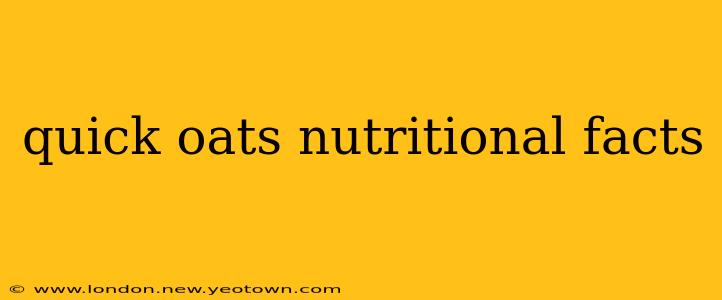Quick oats, those convenient little rolled oats, are a breakfast staple for many. But beyond their speed and ease of preparation, what exactly makes them a healthy choice? Let's delve into the nutritional facts of quick oats, exploring their benefits and addressing some common questions.
Imagine a crisp autumn morning. The smell of cinnamon and apples fills the air. You're preparing a quick and wholesome breakfast, a warm bowl of quick oats, the perfect start to a busy day. But what exactly are you fueling your body with?
Quick Oats Nutritional Breakdown (per 1/2 cup dry)
This nutritional information is an approximation and can vary slightly depending on the brand and any added ingredients. Always check the nutrition label on your specific packaging.
- Calories: Approximately 150-170
- Protein: Around 5 grams
- Fat: About 2-3 grams (mostly unsaturated)
- Carbohydrates: Approximately 27-30 grams
- Fiber: A significant 4 grams (contributing to digestive health)
- Sugar: Naturally occurring sugars, typically less than 1 gram
- Vitamins and Minerals: Good source of iron, magnesium, manganese, and several B vitamins.
This seemingly simple breakfast option packs a nutritional punch, providing sustained energy and crucial nutrients. But let's dig deeper into some frequently asked questions.
Are Quick Oats as Healthy as Old-Fashioned Oats?
This is a common query. While old-fashioned oats retain more of their fiber and nutrients due to less processing, quick oats are still a nutritious choice. The difference primarily lies in cooking time and texture; quick oats are simply rolled thinner and therefore cook faster. The nutritional differences are relatively minor. Both are excellent sources of fiber and essential nutrients.
How Much Fiber is in Quick Oats?
As mentioned earlier, a 1/2 cup serving of dry quick oats provides approximately 4 grams of fiber. This is a substantial contribution to your daily fiber intake, promoting healthy digestion and regularity. Fiber also helps regulate blood sugar levels and can contribute to feelings of fullness.
What Are the Health Benefits of Eating Quick Oats?
The benefits extend beyond just fiber. Quick oats offer a range of health advantages:
- Heart Health: The soluble fiber in oats can help lower LDL ("bad") cholesterol levels, reducing the risk of heart disease.
- Blood Sugar Control: The fiber helps regulate blood sugar levels, making them a good choice for people with diabetes or those looking to manage their blood sugar.
- Weight Management: The fiber and sustained energy from oats can help you feel fuller for longer, potentially aiding in weight management.
- Digestive Health: The fiber content promotes regular bowel movements and overall digestive health.
Are Quick Oats Gluten-Free?
No, regular quick oats are not gluten-free. They are processed in facilities that may also process wheat, barley, and rye. Look for certified gluten-free quick oats if you need to avoid gluten.
Can I Eat Quick Oats Every Day?
Yes, incorporating quick oats into your daily diet can be a healthy habit. However, variety is key. A balanced diet including a variety of fruits, vegetables, and other whole grains is always recommended.
In conclusion, quick oats offer a convenient and nutritious way to start your day. While minor differences exist compared to old-fashioned oats, they still provide a significant amount of fiber, essential nutrients, and numerous health benefits. So, next time you're looking for a quick and healthy breakfast, remember the power packed into those humble quick oats.

